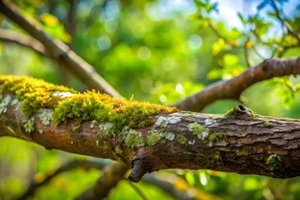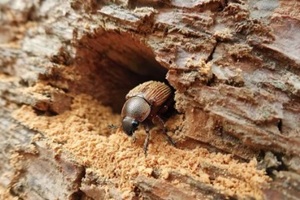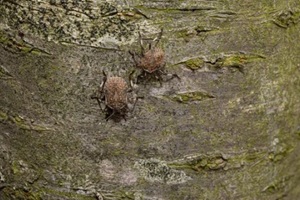
Trees throughout Virginia offer benefits such as cooling properties, air quality improvement, wildlife support, and increased curb appeal. However, these resources are susceptible to certain types of insect pests that may weaken or damage them.
For homeowners, especially those in green areas in Virginia and Maryland, knowing which pests pose genuine harm is essential to preserving your landscape’s health and value.
This article will examine which tree pests are the most harmful to trees in Northern Virginia, and how an experienced tree care service can help protect your property from bugs.
Common Harmful Pests Affecting Trees in Virginia
Many insects may be found on trees, but only some cause significant damage. Here are several pests known for harming Virginia’s trees:
Emerald Ash Borer (EAB)
Emerald Ash Borer (EAB) is an invasive beetle that kills ash trees when its larvae tunnel under the bark and cut off nutrients. Signs include thinning crowns, bark splitting, and small, D-shaped exit holes.
Gypsy Moth
The caterpillars of the Gypsy moth are voracious defoliators that can strip leaves from oak, birch, and other hardwood trees, leaving them vulnerable to disease and environmental stress. The USDA Forest Service discusses gypsy moth biology and control in depth.
Southern Pine Beetle
Common in Virginia’s pine forests, this beetle bores under bark and interrupts nutrient flow, often killing trees quickly. The Virginia Department of Forestry offers pest alerts and management advice regarding the Southern Pine Beetle.
Why It’s Important to Act Quickly
Early detection of pest infestations is essential. Catching pests early allows for effective, targeted treatment that can save trees and limit spread. Left untreated, infestations can lead to weakened trees that are more susceptible to disease, storm damage, or even death.
Watch your trees for dead or thinning branches, or unusual leaf discoloration or curling, all of which can indicate that invasive bugs are making your tree their home. Holes or tunnels in bark or branches, or excess sap or sawdust-like material near the base or trunk are also signs that an insect problem is brewing.
Your problem could soon become your neighbor’s issue too if left unchecked. Reporting new or unusual pest sightings to local extension offices or the Virginia Department of Forestry helps protect trees across the entire community.
Protecting Your Trees: Prevention and Management
Maintaining healthy trees reduces vulnerability to pests. These steps can help protect your trees:.

- Plant species well-suited to your site conditions.
- Prune dead or weak branches carefully to reduce entry points for pests.
- Avoid injuries to trees from lawn equipment.
- Refrain from moving firewood or plant material from one location to another, especially from infested areas.
The USDA also highlights Integrated Pest Management (IPM) as a best practice, combining monitoring, cultural practices, biological control, and chemical treatments when necessary to minimize pest damage while protecting beneficial species.
Community Efforts to Limit Pest Spread
Many invasive pests spread rapidly through human activity, mainly when firewood or nursery plants are transported across regions. Virginia has specific quarantine zones and guidelines designed to reduce this risk.
For example, SLF-infested areas are regulated to prevent further spread. Awareness and compliance with these regulations help protect all Virginia tree owners.
How Professionals Support Tree Health in Virginia
Protecting your trees from pests often requires professional expertise. Homeowners and commercial properties in Northern Virginia should seek out companies that employ ISA-certified arborists trained to:
- Inspect trees thoroughly for early signs of pest activity
- Develop treatment plans customized to each property’s specific needs
- Apply environmentally responsible pest control methods to protect trees and beneficial wildlife
- Provide expert advice on tree trimming and maintenance to support long-term tree health
Their commitment to sustainable, preservation-based care helps property owners avoid costly tree loss while maintaining the natural beauty and value of their landscapes.
Protect Your Virginia Trees with RTEC Treecare’s Expert Care
Working with an experienced tree care company keeps your trees healthy and attractive. RTEC Treecare has been serving homeowners and commercial clients in Northern Virginia since 1996, combining certified arborist expertise with an environmentally responsible approach.

RTEC’s team understands the distinct challenges presented to trees in Virginia, including the wide range of harmful pests that threaten their vitality. We conduct thorough inspections to identify potential issues at an early stage and formulate customized treatment plans that emphasize sustained tree health and environmental stewardship.
From managing neighborhood properties to large estates in Alexandria or elsewhere in Northern Virginia, RTEC Treecare is ready to protect your investment.
Contact RTEC Treecare online or call (571) 506-6140 to schedule an expert consultation and learn how their preservation-based methods can keep your trees thriving for decades.


